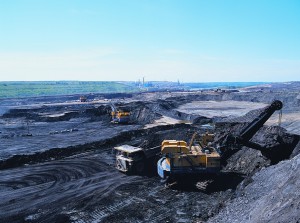Film Review: Dirty Oil
Article published: Friday, March 19th 2010
On Monday 15 March, the world premiere of Leslie Lwerk’s new film Dirty Oil screened simultaneously at 24 cinema’s across the United Kingdom. The venues were connected via satellite connection so that viewers could participate in an interactive panel discussion by sending in text messages to the director and activists involved in the campaign. The Manchester audience was on top form, dazzling the compare with the lion’s share of pertinent questions.
 The film focuses on the growing exploitation of the Athabasca tar sands in Alberta, Canada which is having devastating effects on local communities and the global environment. Canada’s oil reserves are second only to Saudi Arabia’s and their tar sand reserves amount to the equivalent of 174 billion barrels of oil. The process of extracting bitumen from the sand produces eight times more carbon dioxide than conventional oil extraction. Shell, ExxonMobil, ConocoPhillips, Total and BP are all involved in extraction projects and are planning further expansion in the region.
The film focuses on the growing exploitation of the Athabasca tar sands in Alberta, Canada which is having devastating effects on local communities and the global environment. Canada’s oil reserves are second only to Saudi Arabia’s and their tar sand reserves amount to the equivalent of 174 billion barrels of oil. The process of extracting bitumen from the sand produces eight times more carbon dioxide than conventional oil extraction. Shell, ExxonMobil, ConocoPhillips, Total and BP are all involved in extraction projects and are planning further expansion in the region.
With high prices and insecure supplies in the Middle East, and peak oil looming in the background, the tar sands are an important political and economic resource. At the start of the film, several Americans are asked where they think their oil comes from. The unanimous response was the Middle East, whereas the primary supplier of US oil is Canada.
Millions of dollars are being invested into this difficult process rather than being invested into renewable energy production. Tar sand extraction has heavily affected the local environment with millions of tonnes of Boreal forest being removed and lots of toxic tailings contaminating water supplies.
Indeed, the film reveals that “lakes of toxic waste can be seen from outer space”. These have affected local indigenous communities with outbreaks of cancer far higher than the national average. The film reports that the “local pollution [is] equivalent to a major oil spill every year” and the effects are not only felt locally. It is estimated that if all the oil underneath the tar sands were to be extracted, a further 10 parts per million of carbon would be added to the atmosphere, leaving only a further five parts per million before scientists predict signals the onset of runaway climate change.
Dirty Oil is the latest film to be released as part of a series of progressive documentaries that have been sponsored by The Co-operative Group. Petropolis and H2Oil, also about the tar sands, are also due for release in the spring. The film ended with a call for levels of social co-operation not seen since the war effort in order to tackle climate change. As Lester Brown, director of the Earth Policy Institute, reminded the audience: “climate change is not a spectator sport”.
Kirsten Ferrari and Ben Lear
See here for further information about the film and ideas about how to get involved with the campaign.
See here for more information about the Co-operative Group’s campaign against the Tar Sands and in support of the Beaver Lake Cree Nation
Comments
-
Hmmm…Lester Brown eh? If he’s prominent in the film I have my concerns! He’s a pretty big cheese in the US and has been peddling population control and immigration restrictions for decades.
Comment by Free Movement for All on March 19, 2010 at 11:04 am
The comments are closed.



